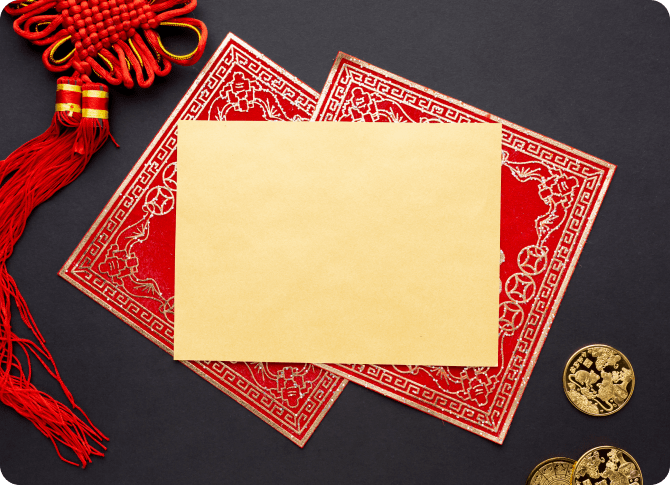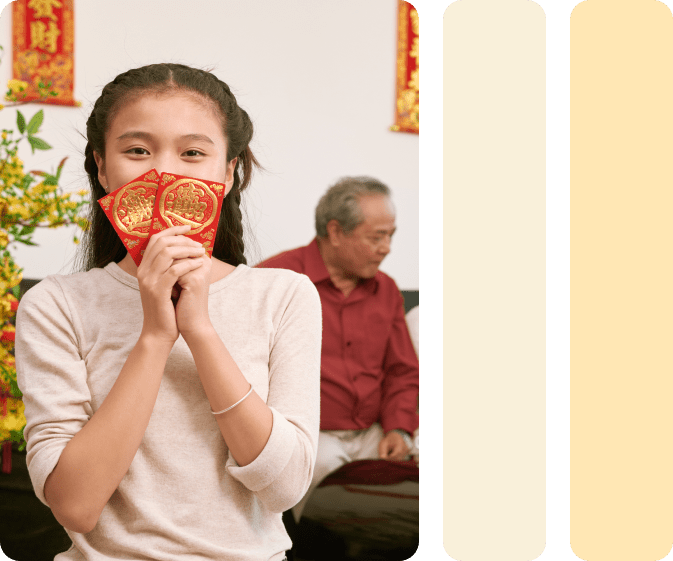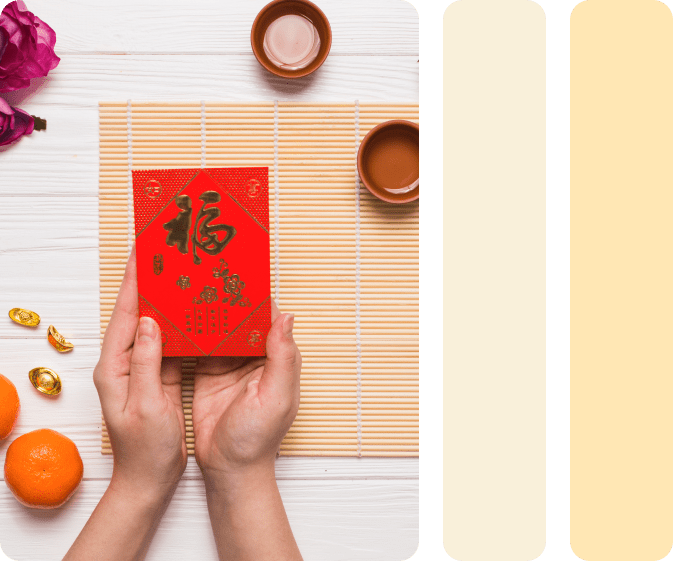Cherish and enrich ancestors and past loved ones
Joss Paper 纸钱
The burning of joss paper (spirit or hell money) holds deep cultural and spiritual meaning for millions of Chinese people worldwide.
This practice is deeply rooted in Chinese culture and represents filial piety, a fundamental value emphasizing respect and care for ancestors.
Families use this ritual to express gratitude and ensure their ancestors are well-provided for in the afterlife. Offering joss paper strengthens family bonds and continuity, often performed by multiple generations together, honoring their shared heritage.

HISTORY
The History of Joss Paper
The tradition of burning joss paper originated from ancient Chinese beliefs in the afterlife and ancestor worship. It was first practised during the Tang Dynasty (618-907 AD), over 2,000 years ago. Blending elements from Taoist and Buddhist traditions, it has become a central practice in various important festivals. These include the Qingming Festival, the Zhong Yuan Jie (Hungry Ghost Festival), and several other significant celebrations.
The process of burning joss paper generally involves several symbolic steps. Families usually gather at the graves or ancestral altars of their deceased loved ones to perform this meaningful ritual. They prepare offerings, including food, incense, and joss paper, which are essential components of the ceremonial process.
Joss paper, also known as ghost money or spirit money, often resembles currency or valuable or even luxury items. Once the offerings are prepared, the ghost money is burned, and its smoke rises to carry offerings to the spiritual realm. This act is accompanied by prayers and expressions of respect.
Burning “ghost money” embodies several virtues:
Family: It showcases the unwavering respect and reverence for one’s ancestors, ensuring their well-being and comfort in the afterlife.
Generosity: The act of offering wealth and comfort to the deceased reflects the living’s selflessness and desire to care for their ancestors.
Continuity: By performing these rituals, families maintain a continuous connection with their ancestors, preserving their legacy and stories.
Spiritual Harmony: The ritual fosters a sense of spiritual harmony, balancing the material and spiritual worlds, and ensuring the smooth flow of Qi.

ABOUT THE FESTIVAL
Honouring Ancestors: The Spiritual Significance of Burning Ghost Money
The burning of joss paper is more than a cultural practice, it is a deeply spiritual act. It is believed that the smoke rising from the burning paper carries prayers, messages, and offerings to the ancestors. This creates a bridge between the living and the dead, fostering a sense of unity and continuity. Ancestors are thought to receive these offerings with gratitude, bestowing blessings and protection upon their descendants in return.
This practice allows the living to express their love, respect, and remembrance of their forebears. It is a moment of profound connection, where the boundaries between the physical and spiritual worlds blur. This allows the living to care for and honor their ancestors in a meaningful and respectful way.
The act of burning joss paper thus becomes a powerful ritual that reinforces the values of family, respect, and spiritual harmony, cherished by millions of people across generations.
The act of burning joss paper is deeply intertwined with the concept of Qi. It is more than just a symbolic gesture, it’s a ritual to enhance and transmit Qi. By burning these offerings, the living infuse their ancestors’ spirits with the energy needed to thrive in the afterlife. This act ensures the comfort and prosperity of the deceased while maintaining the flow of Qi between generations. It keeps the family lineage spiritually connected and balanced, preserving ancestral harmony.
The Role of Qi in Joss Rituals: Bridging the Living and the Spiritual
Through the interplay of Qi, the material world and the spiritual realm find a point of convergence. It is a dance of energies, harmonizing the material and spiritual realms, the tangible and the celestial. This ancient wisdom of Qi continues to influence and enrich cultural and spiritual practices, especially during sacred rituals. Notably, these practices include the Qingming Festival 清明節 and the Zhong Yuan Jie Festival.
Burning ghost money, often resembling money or valuable items, is believed to send wealth and prosperity to ancestors. The ritual symbolizes the transfer of Qi from the living to the deceased, ensuring their well-being in the afterlife. Smoke from the burning of joss paper rises, carrying prayers and blessings to ancestors, connecting the physical and spiritual worlds. This practice honours and provides for the deceased, reinforcing the bond between the living and the dead. It is a powerful spiritual act that embodies the principles of Qi, family, community, and the flow of life and death.
It is a way for the living to demonstrate their love and respect for their ancestors, ensuring that their spirits are cared for and remembered.
JOSS MONEY
Digital Joss Paper
Today Digital joss paper (offerings) provides ancestors and worshipers a deeper spiritual experience bypassing traditional physical boundaries. Digital joss paper (hell money) are said to be vaporized into electromagnetic energy where the essential essence of the offering is transformed into a spiritual or vital energy.
This energy, infused with the intentions and emotions of the giver, can permeate the qi (齊) and travel into the fabric of the universe, transcending the boundary between the material world and the spiritual realm. Allowing the ancestors to receive and experience the offering on a deeper, spiritual level bypassing traditional physical boundaries.
This Digitized “qi” has the ability to traverse time and space, connecting the living with the ancestors. By sending digital Joss paper into the ethos, we can imagine the “qi” carrying the essence of the offering to the ancestors in a more efficient and accessible manner, bypassing traditional physical boundaries, eliminating dangerous chemical pollutants that disrupt the balance of qi and nature.

